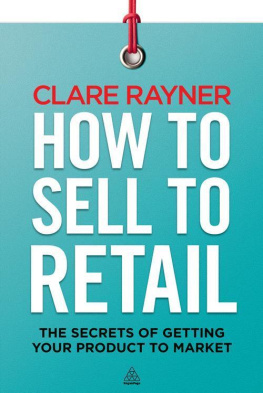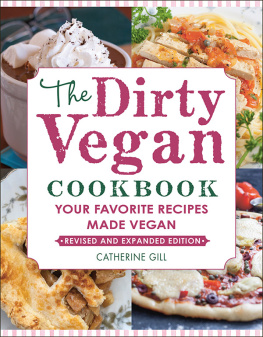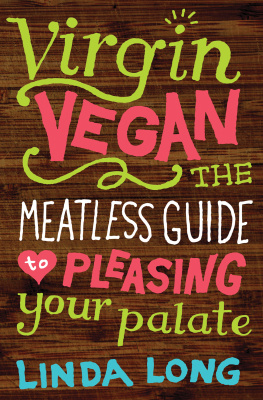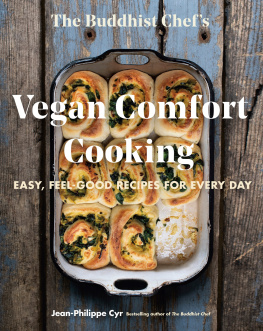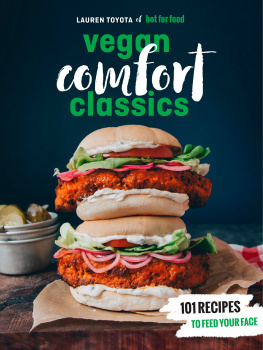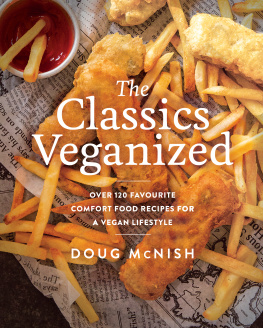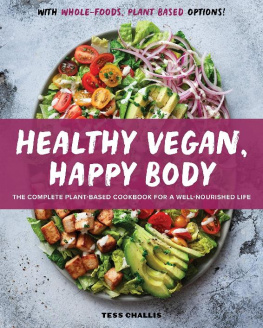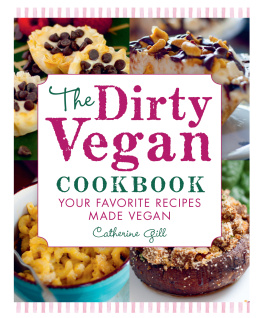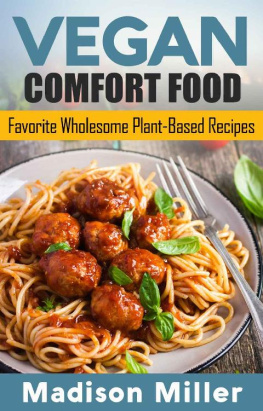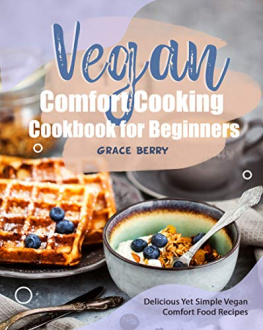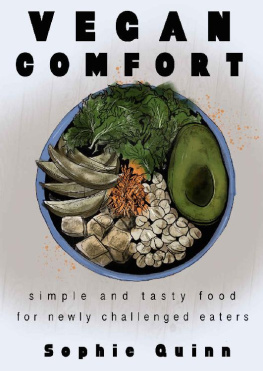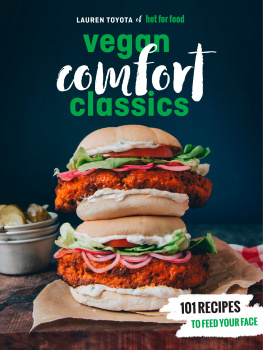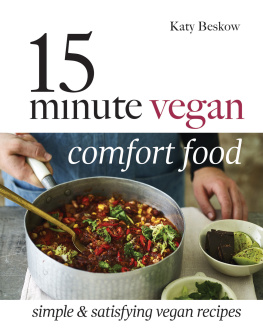Vegan Comfort Cooking
Delicious Vegan Comfort Food Recipes to Satisfy Every Craving
BY
Rachael Rayner
Copyright 2020 Rachael Rayner
License Notes
No part of this Book can be reproduced in any form or by any means including print, electronic, scanning or photocopying unless prior permission is granted by the author.
All ideas, suggestions and guidelines mentioned here are written for informative purposes. While the author has taken every possible step to ensure accuracy, all readers are advised to follow information at their own risk. The author cannot be held responsible for personal and/or commercial damages in case of misinterpreting and misunderstanding any part of this Book
Thanks for Purchasing My Book!
Thank you so much for purchasing my book! As a reward for your purchase, you can now receive free books sent to you every week. All you have to do is just subscribe to the list by entering your email address in the box below and I will send you a notification every time I have a free promotion running. The books will absolutely be free with no work at all from you! Who doesnt want free books? No one! There are free and discounted books every Friday , and an email is sent to you 1 days beforehand to remind you so you dont miss out. Its that easy! Enter your email now to get started!
For a complete list of my published books, please, visit my Author's Page:
https://www.amazon.com/author/rachael.rayner
Table of Contents
Introduction
I have been a vegan for just over ten years, and it was the best decision I have ever made. In 2008, I was diagnosed with type 2 diabetes; the doctors told me that there was no cure and I would be on insulin for the rest of my life. Initially, I accepted this, after all, doctors know everything, right? But during my first year of taking insulin and really not feeling too great from all the side effects, I decided to start researching alternative medicine and discovered that the biggest contributor to diabetes was a bad diet.
I had a terrible diet, I was overweight, I ate every greasy and unhealthy food you could think of and I didnt do any exercise. I started by doing simple things like replacing refined grains with whole grains and drinking water with my meals instead of soda. Then, I started adding more fruit and vegetables to my diet, and within a year, I had transitioned to veganism.
During this time, I would visit my doctor for my regular check-ups, he was impressed with my weight loss and the fact that he was able to reduce my insulin intake. Within two years of becoming vegan, I was diabetes free and I havent looked back since.
However, despite the fact that I was cured from diabetes, lost loads of weight, and was healthier than I had ever been, there were a lot of meals that I really missed eating. I wasnt stupid enough to go and start buying buckets of fried chicken again, but I started researching the vegan versions of the foods I missed, and I was really impressed with what I found.
I was able to re-create all of my favorite comfort foods, but the healthy version and not feel in the least bit guilty about eating them, I was in heaven and so excited about my new discovery. I started holding dinner parties with my non-vegan friends and not tell them that what they were eating was vegan until the end of the meal, they were all fooled!
Not only are these meals finger-licking good, but they are also full of healthy nutritious ingredients that will boost your energy levels and make you feel fantastic. To begin, I would like to talk about some of the health benefits of veganism.
The Health Benefits of Veganism
You will often hear a lot of health experts advise that we need to eat animal products to get nutrients such as protein and calcium. When you think about this logically, it makes absolutely no sense because the animals that we get these products from are all vegetarians. Cows eat grass and hay; they get the calcium that they give us from the grass they eat. Calcium is a mineral found in soil that is absorbed by the grass. We actually get more calcium from dark leafy green vegetables than from drinking milk and eating cheese. When we consume dairy products, we lose 66% of the calcium through our urine. However, when we eat plant-based products containing calcium, the body absorbs 60 percent of it.
The same is true about protein; not only is it found in leafy green vegetables such as spinach, broccoli, asparagus, and alfalfa sprouts. There are also high levels of protein found in legumes such as white beans, lentils, pinto beans, split beans, black beans, navy beans, and kidney beans.
Efficient Kidney Functioning and Reduces Blood Sugar
I will start with this benefit because this is what helped to get rid of my type 2 diabetes. Several studies suggest that, in general, vegans have a high sensitivity to insulin, and they have lower blood sugar levels. Research has also found that the vegan diet is more effective than the diet recommended by the American Diabetes Association.
Protects Against Cancer
The World Health Organization suggests that approximately one-third of all cancers are preventable. One of the main factors for protecting the body against the disease is diet. For example, a diet that is high in legumes reduces the risk of colorectal cancer by between 9-18%.
Reduced Risk of Heart Disease
A diet high in fiber, legumes, fresh fruits, and vegetables reduces the risk of heart disease. A number of studies have found that vegans are up to 75% less likely to suffer from high blood pressure (a major contributing factor to heart disease) than non-vegans.
Vegan Foods to Eat
As you have read, a vegan diet means that you dont eat any animal products, and that includes dairy. If you are new to the vegan lifestyle, it can get a bit confusing about what foods to eat. So, to get you started, here is a comprehensive list of the foods you can and cannot eat on a vegan diet:
Vegetables: Broccoli, peppers, asparagus, kale, spinach, cauliflower, tomatoes.
Whole Grains: Couscous, kamut, spelt, buckwheat, amaranth, wild rice, brown rice, faro, barley, whole-wheat pasta, whole-wheat bread, quinoa, rolled oats.
Starchy Vegetables: Potatoes, sweet potatoes, squash.
Legumes: Lentils, peas, black beans, peanuts, chickpeas.
Healthy Fats: Coconut oil, olive oil, unsweetened coconut, avocados.
Fruits: Pears, berries, pineapples, apples, bananas, citrus fruits.
Seeds: Tahini, almonds, cashews, almond butter, pumpkin seeds, sunflower seeds, Macadamia nuts.
Spices and Seasonings: Black pepper, basil, sea salt, curry, turmeric, rosemary.
Drinks: Sparkling water, water, smoothies, fresh fruit and vegetable juices, unsweetened teas and coffees.
Plant-based Milk (unsweetened): Oat milk, cashew milk, coconut milk, almond milk.
Condiments: Nutritional yeast, salsa, lemon juice, vinegar, tamari, soy sauce, vegan mayonnaise, mustard.
Plant Based Proteins: Tofu and tempeh.
Foods Not to Eat on a Vegan Diet
Being on a vegan diet means you will need to read your food labels because there are some foods that contain animal products, but you dont know this until you read the ingredients, so I would strongly advise you to do this when you do your grocery shopping just to double-check.





